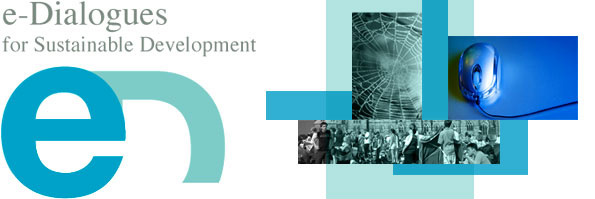|
The way we think of waste management is changing. While once waste was seen as an end product to be disposed of it is increasingly seen as a material and energy source for industrial processes. In many parts of Canada, for example, green bins and municipal composting are creating a valuable end product while diverting the waste headed for landfill. However this positive change is occurring against a backdrop of a waste crisis in our country. Landfill space is becoming scarce, and cities are struggling with wastewater systems that were designed and built as long as a century ago. Our treatment of waste products must evolve if we are to protect the environment while ensuring the functioning of the economy.
This dialogue brings together a diverse panel of experts from the waste management field to discuss infrastructure needs for a sustainable waste management system in Canada.

Join us at 4:00pm EST on Wednesday, December 6th , in a discussion featuring leading experts.
|
Dr. Ann Dale, Professor,
Science, Technology & Environment, Royal Roads University
Trudeau Fellow
 Dr. Dale is a rare hybrid, both an academic and an activist. Currently she is engaged in two major research initiatives at Royal Roads University. First, she is leading the e-Dialogues for Sustainable Development, a series of online dialogues exploring critical issues using the power of the internet to influence public policy. Second, she is working on exploring the relationship between social capital and sustainable community development. Dr. Dale is a rare hybrid, both an academic and an activist. Currently she is engaged in two major research initiatives at Royal Roads University. First, she is leading the e-Dialogues for Sustainable Development, a series of online dialogues exploring critical issues using the power of the internet to influence public policy. Second, she is working on exploring the relationship between social capital and sustainable community development.
| Background |
|
|
Infrastructure choices play a central role in the creation and maintenance of communities that are sustainable, livable, and prosperous. The challenge is to engage with people and their diverse cultures, interests, visions, priorities and needs. One of the major reasons sustainable community development remains largely unresolved within municipalities is gridlock in the planning and implementation processes for decision-making. There are basic disconnections between federal, regional and local governments, between rural and urban communities, and between business and research communities. The challenge is to encourage widespread adoption of the infrastructure decisions being made by communities on the lead-edge of adoption of more sustainable infrastructure.

This series of e-dialogues will explore infrastructure choices in the five focus areas of the Sustainable Infrastructure project: energy, transportation, waste management, land use planning and governance. We will also hold a wrap-up dialogue that finds common ground from these five areas. These e-dialogues will involve experts from the field discussing the critical infrastructure choices necessary for sustainable community development and leading-edge North American examples of sustainable infrastructure development. Through these dialogues, we hope to develop an understanding of how current municipal decision-making may lead toward achievement of sustainability objectives. We hope you will join us in these vibrant discussions.
|
| Panelists |
|
 |
Ann Dale, Project Lead, Moderator
Ann Dale is a professor with the School of Environment and Sustainability, Faculty of Social and Applied Sciences at Royal Roads University and holds a Canada Research Chair in Sustainable Community Development (crcresearch.royalroads.ca). She chairs the Canadian Consortium for Sustainable Development Research (CCSDR), a consortium of all the heads of research institutes across Canada, and is active in the Canadian environmental movement. Dr. Dale chairs an organization she created, the National Environmental Treasure (the NET) and is the Executive Co-ordinator, Research and Public Policy for the Canadian Biodiversity Institute. From 1998-2000, she led an energy efficiency program on behalf of the Association of Canadian Community Colleges. Previously, she was an Executive with the Federal Government, and was one of the two public servants behind the creation of the National Round Table on the Environment and the Economy (NRTEE).
Dr. Dale is a Trudeau Fellow (www.trudeaufoundation.ca), as well as a Fellow of the World Academy of Art and Sciences. She is also a Board member of the World Fisheries Trust, and the Advisory Committee to the Montreal Institute for the Environment. Dr. Dale holds degrees in psychology and public administration from Carleton University, and a doctorate in Natural Resources Sciences, McGill University. Current research areas include governance, social capital and sustainable community development, biodiversity policy, and deliberative electronic dialogues (crcresearch.royalroads.ca/edialogues). She is a recipient of the 2001 Policy Research Initiative Award for Outstanding Contribution to Public Policy for her book, At the edge: sustainable development in the 21st century.
|
| |
Jerry Leonard
Dr Jerry Leonard is the Executive Manager of the Edmonton Waste Management Centre of Excellence (EWMCE). He is on secondment from the University of Alberta, where he is a professor of bioresource engineering. His research interests include composting and, through this, he became involved with the City of Edmonton’s Waste Management Branch in 1996. This led to his participation in setting up the EWMCE when he was first seconded to the Centre in 2002.
|
| |
Alfred Von Mirbach
Alfred Von Mirbach has been working on create and effective waste diversion solutions since 1990. He has designed and launched award-winning recycling and composting programs as a municipal staff person and as a consultant, and spent countless hours doing waste characterization studies (i.e. garbage sorts) to determine just how effective programs actually are. Projects have ranged in scale from small township depots to waste minimization strategies for the City of Winnipeg. Recently, he has worked with Waste Diversion Ontario to create tools for waste diversion coordinators.
Ecoperth: www.ecoperth.on.ca
Stewardship Ontario: www.stewardshipontario.ca
Association of Municipal Recycling Coordinators: www.amrc.ca
|
 |
Dwight Mercer
Dwight Mercer has over twenty-five years experience as a professional in the fields of land use planning and development planning, strategic policy development in urban planning and solid waste management, floodplain-water resource management which included the comprehensive flood plain management, contract administration-program management, and most recently, in the emerging field of waste minimization: all within the context of sustainable development in Saskatchewan. Dwight is a Graduate Studies Candidate, University of Regina - Centre for Sustainable Communities, having completed a BA(Hons) some years ago at the University of Regina. Currently he has eight years experience in the managmenet of twelve waste minimization programs within the broader aspect of solid waste management for the City of Regina.
Regina Paint It Recycled - 15 October 2005 Summary Notes (doc)
|
 |
Chris Ling
Chris Ling is a recent post-doctoral émigré from England, now living in Victoria, British Columbia and employed as a post-doctoral fellow at Royal Roads University. He grew up in suburban south-eastern England with a short diversion to Sheffield in Yorkshire. His background is in Environmental Sciences which he read at Southampton University. He also achieved an M.Sc in Pollution and Environmental control and a PhD in Planning and Landscape examining quality of life capital in post-industrial landscapes. His main areas of research interest are landscape multifunctionality, quality of life capital, urban fringe and post-industrial landscapes and sustainability.
|
 |
Steve Simmering
Steve Simmering is a Principal and Civil Engineer with Golder Associates. With more than 30 years of experience in consulting engineering, Mr. Simmering has a broad base of experience in municipal and environmental engineering including project planning, approvals, design and construction supervision, zoning, site applications, site plans, and subdivisions on urban and private services, rural sewage and water treatment systems, sanitary sewage collection, roads and drainage, stormwater management, water distribution and treatment, sanitary landfills and sewage treatment plants.
Mr. Simmering has handled some unique challenges, including projects in the Canadian Arctic. Mr. Simmering’s project experience has involved site servicing design and construction review for public and private projects at hospitals, schools, resorts, industries and shopping centres. Mr. Simmering’s diverse background in engineering and approval processes is complemented by his ability to guide projects to completion on schedule under compressed timeframes.
Mr. Simmering’s success’ are based on the belief that understanding the process and interreacting with all levels of Government are paramount.
Golder Associates Profile (pdf)
|
 |
Joanne St. Godard
Jo-Anne St. Godard has been working with the Recycling Council of Ontario for six years, the past three as Executive Director. Jo-Anne has been intimately involved in negotiating, facilitating and informing businesses, governments and individuals, supporting their transition toward environmentally sustainable philosophies, policies and practices.
Over the past 3 years, Jo-Anne has been participated in the development of waste diversion and stewardship programs and policies at both a provincial and national level. Through her role on the RCO, she has participated in the development of new provincial stewardship programs for blue box packaging waste, used tires, used oil and electronic wastes.
http://www.rco.on.ca
|
|
|
Royal Roads University
School of Environment and Sustainability
edialogues@royalroads.ca
|
|







